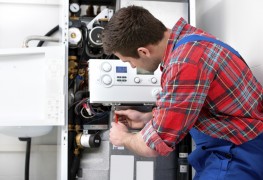- Home
- Smart Tips
- Home & Garden
- Heating
132
result(s)
Tankless water heaters are more efficient than traditional water heaters, but are they the right choice for your household? Here's some insight to help you decide.
The scent of a wood fire makes you feel cozy, doesn’t it? That doesn't mean your wood stove, fireplace, insert or furnace are safe. Warm your home without the risks of carbon monoxide buildup and other risks with these safety tips.
Keeping your home at a "standard" room temperature can kill a budget. Try these money-saving tricks to lower your thermostat this winter and still stay warm.
If the thought of maintaining your forced-air heating system fills you with dread, relax. There are simple steps to take care of it.
Major weather forecast agencies agree—another brutal winter is on its way for much of the country. Is your home prepared for freezing temperatures? The following guide offers useful tips on how to prepare for the season ahead.
Wintertime energy bills can be steep, especially if your home is losing heat through gaps in inefficient windows and doors. The following tips can help you prevent heat loss and save money.
A smart thermostat can help reduce energy consumption by controlling your home's temperature at any time. But these tools do have some drawbacks. These pros and cons will help you decide if this device is what you need.
Knowing more about your furnace can potentially save you a lot of money. Here are five tips for maintaining your forced-air heating system.
There are several smart thermostats on the market now. If you're not sure what makes a "smart" thermostat better than what you already have connected in your home, here's a rundown of some of its most important features.
According to Natural Resources Canada, almost two-thirds of all home energy use goes toward space heating. As such, your electric usage may drop dramatically if you use a smart thermostat to track when and where to run your heating and cooling unit.
Utility bills and uncomfortable rooms are the main issues when your ducts aren't properly sealed. But you don't need a contractor to do it for you. If you're handy around the house, it's a job that you can tackle with these few steps and precautions.
For straightforward installation contact a professional, but first, consider the factors that will affect the total cost.
Check out the quick guide below to find out how you can conveniently control your home's temperature and save on your energy bills with three types of high-tech thermostats.
Hot water from your boiler is pumped to the radiators via a flow pipe; cooler water is fed back from the radiator to the boiler through a return pipe. Each radiator has two valves: a handwheel valve, or thermostatic radiator valve (TRV), allows you t
Problems with heating often come to light in the autumn when you turn on your system, or light your wood-burning stove, after a summer break. Cast-iron or steel wood-burning stoves are an efficient way to heat your home and help create a cosy atmosph
How do you heat your home? Both gas and wood-burning heating can be effective, but they need to be used with safety in mind. Here are a few pointers to help you boost your gas or wood heater's efficiency.
An earth-covered house provides one of the most energy-efficient forms of shelter imaginable, along with many other benefits. Here are some things to consider when thinking about an earth-covered home.
Solar energy is one of the world's most powerful and renewable resources. Recently, there has been a major push towards solar energy, but it has been used for hundreds of years. Check out some history:
There are many ways to generate energy other than burning oil or coal — some methods are old, some fashionable, some expensive, and a few are still technological dreams. Here's a few alternatives:
Going solar is a cool way to heat your water and lower your energy costs. Whether you're installing a new system or converting a gas or electric one, here's what you should know before you buy.




















